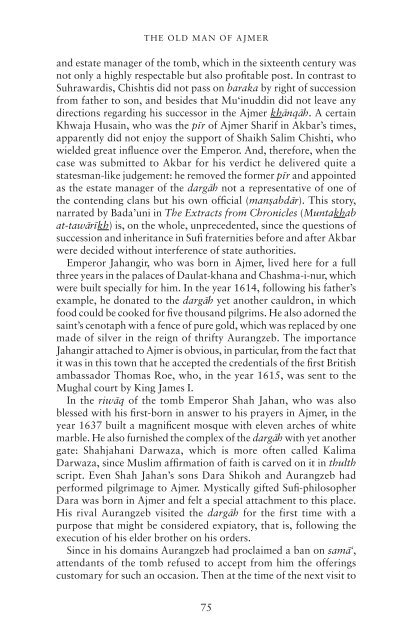Muslim Saints of South Asia: The eleventh to ... - blog blog blog
Muslim Saints of South Asia: The eleventh to ... - blog blog blog
Muslim Saints of South Asia: The eleventh to ... - blog blog blog
Create successful ePaper yourself
Turn your PDF publications into a flip-book with our unique Google optimized e-Paper software.
THE OLD MAN OF AJMER<br />
and estate manager <strong>of</strong> the <strong>to</strong>mb, which in the sixteenth century was<br />
not only a highly respectable but also pr<strong>of</strong>itable post. In contrast <strong>to</strong><br />
Suhrawardis, Chishtis did not pass on baraka by right <strong>of</strong> succession<br />
from father <strong>to</strong> son, and besides that Mu‘inuddin did not leave any<br />
directions regarding his successor in the Ajmer khānqāh. A certain<br />
Khwaja Husain, who was the pīr <strong>of</strong> Ajmer Sharif in Akbar’s times,<br />
apparently did not enjoy the support <strong>of</strong> Shaikh Salim Chishti, who<br />
wielded great influence over the Emperor. And, therefore, when the<br />
case was submitted <strong>to</strong> Akbar for his verdict he delivered quite a<br />
statesman-like judgement: he removed the former pīr and appointed<br />
as the estate manager <strong>of</strong> the dargāh not a representative <strong>of</strong> one <strong>of</strong><br />
the contending clans but his own <strong>of</strong>ficial (manșabdār). This s<strong>to</strong>ry,<br />
narrated by Bada’uni in <strong>The</strong> Extracts from Chronicles (Muntakhab<br />
at-tawārīkh) is, on the whole, unprecedented, since the questions <strong>of</strong><br />
succession and inheritance in Sufi fraternities before and after Akbar<br />
were decided without interference <strong>of</strong> state authorities.<br />
Emperor Jahangir, who was born in Ajmer, lived here for a full<br />
three years in the palaces <strong>of</strong> Daulat-khana and Chashma-i-nur, which<br />
were built specially for him. In the year 1614, following his father’s<br />
example, he donated <strong>to</strong> the dargāh yet another cauldron, in which<br />
food could be cooked for five thousand pilgrims. He also adorned the<br />
saint’s cenotaph with a fence <strong>of</strong> pure gold, which was replaced by one<br />
made <strong>of</strong> silver in the reign <strong>of</strong> thrifty Aurangzeb. <strong>The</strong> importance<br />
Jahangir attached <strong>to</strong> Ajmer is obvious, in particular, from the fact that<br />
it was in this <strong>to</strong>wn that he accepted the credentials <strong>of</strong> the first British<br />
ambassador Thomas Roe, who, in the year 1615, was sent <strong>to</strong> the<br />
Mughal court by King James I.<br />
In the riwāq <strong>of</strong> the <strong>to</strong>mb Emperor Shah Jahan, who was also<br />
blessed with his first-born in answer <strong>to</strong> his prayers in Ajmer, in the<br />
year 1637 built a magnificent mosque with eleven arches <strong>of</strong> white<br />
marble. He also furnished the complex <strong>of</strong> the dargāh with yet another<br />
gate: Shahjahani Darwaza, which is more <strong>of</strong>ten called Kalima<br />
Darwaza, since <strong>Muslim</strong> affirmation <strong>of</strong> faith is carved on it in thulth<br />
script. Even Shah Jahan’s sons Dara Shikoh and Aurangzeb had<br />
performed pilgrimage <strong>to</strong> Ajmer. Mystically gifted Sufi-philosopher<br />
Dara was born in Ajmer and felt a special attachment <strong>to</strong> this place.<br />
His rival Aurangzeb visited the dargāh for the first time with a<br />
purpose that might be considered expia<strong>to</strong>ry, that is, following the<br />
execution <strong>of</strong> his elder brother on his orders.<br />
Since in his domains Aurangzeb had proclaimed a ban on samā‘,<br />
attendants <strong>of</strong> the <strong>to</strong>mb refused <strong>to</strong> accept from him the <strong>of</strong>ferings<br />
cus<strong>to</strong>mary for such an occasion. <strong>The</strong>n at the time <strong>of</strong> the next visit <strong>to</strong><br />
75


